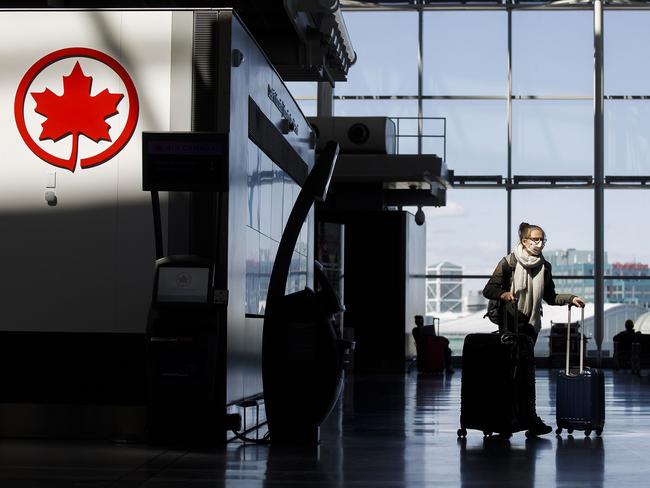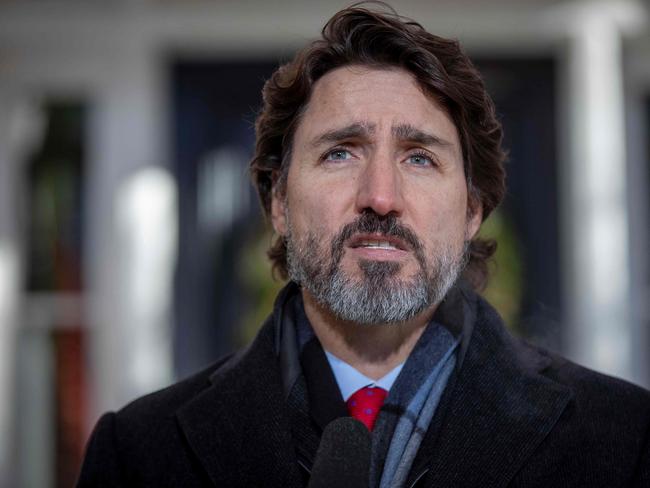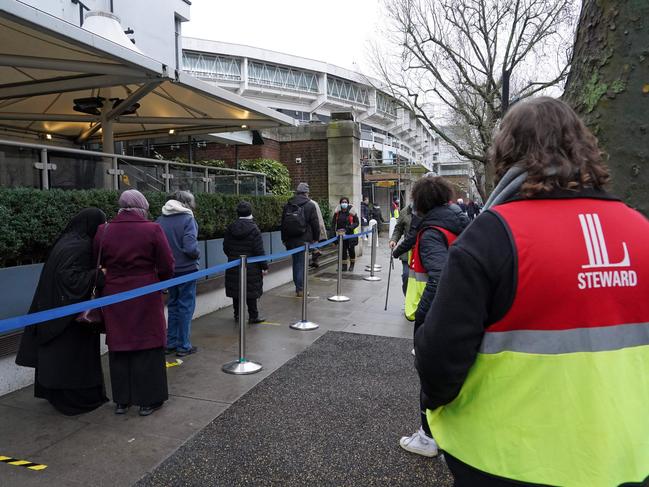Coronavirus: One-third of US has COVID immunity: shock research shows
As many as one-third of Americans could have immunity to COVID-19, according to new claims.
Coronavirus
Don't miss out on the headlines from Coronavirus. Followed categories will be added to My News.
One-third of Americans could have immunity to COVID-19, shock new data-analysis has found.
The New York Post reports, this figure is a combination of those who have had the virus, and are assumed to have some level of immunity as a result, and those who have had at least one dose of the vaccine.
The newspaper reports that is 110 million Americans or 33.2 per cent of the population with some level of protection against COVID-19.
The data analysis follows reasoning from the Centre for Disease Control, that the total number of coronavirus cases in one of the countries worst hit by the pandemic, is much higher than confirmed cases. With the actual infection count between February and December more than 83 million.
That figure added to the more than 5.6 million infections recorded by the COVID Tracking Project since the start of 2021, with the 21.7 million who have had one dose of the vaccine and the number of those with immunity in the US hits 110 million.

ASTRAZENECA VACCINE GETS THUMBS UP
The EU’s medicines regulator has given AstraZeneca’s coronavirus vaccine the green light to be used on adults of all ages, saying it believed it would be safe for older people too.
All eyes had been on whether the European Medicines Agency (EMA) would follow the lead of Germany, which on Wednesday (local time) declined to recommend the vaccine for over-65s, citing insufficient data.
“EMA has recommended granting a conditional marketing authorisation for COVID-19 Vaccine AstraZeneca to prevent coronavirus disease 2019 in people from 18 years of age,” the Amsterdam-based EMA said in a statement on Friday (local time).

The watchdog said that there were “not yet enough results in older participants” over 55 to show how it would work, but that “protection was expected” as an immune response was found in them, and based on experience with other vaccines.
“EMA’s scientific experts considered that the vaccine can be used in older adults,” it said.
“More information is expected from ongoing studies, which include a higher proportion of elderly participants.”
The EMA has already approved the Pfizer/BioNTech and Moderna jabs for the 27-nation European Union, plus the European Economic Area (EEA) countries of Iceland, Liechtenstein and Norway.

The deployment of British-Swedish firm AstraZeneca’s vaccine has been awaited with impatience by European countries as it is cheaper to produce than its rivals, and easier to stock and transport.
An age limit on the jab, developed with Oxford University, would have been a blow for governments that have based their vaccination campaigns on prioritising the frail and elderly.
BITTER ROW OVER DOSE SUPPLY
AstraZeneca has defended its vaccine’s efficacy for all ages, along with Britain, which has already used the shot widely on older people.
Casting a shadow over the EMA decision is the bitter row over the supply of AstraZeneca doses between the EU and Britain.
The firm says there is not enough to go around as production issues have slowed promised deliveries.
The European Commission published a redacted copy of its contract with the drugs giant on Friday, demanding the company meet its prior commitments.
The EMA has meanwhile been under huge pressure to authorise vaccines as quickly as possible as frustration and pressure grow over Europe’s stumbling start to the inoculation campaign.

While it has been working under what it calls an “accelerated timeline”, the watchdog insists that ensuring safety and efficacy are paramount.
AstraZeneca formally applied for authorisation on January 12. The EMA had already been carrying out a “rolling review” of data on the vaccine since October.
Oxford and AstraZeneca had previously been criticised over a lack of clarity and transparency on trials that had shown varying outcomes in the jab’s efficiency.
The EMA reached the decision after a four-day meeting of its Committee for Medicinal Products for Human Use (CHMP), which gathers experts from all EU and EEA countries.
Formal authorisation must be granted by the European Commission in Brussels but that could come within hours.
The EMA said separately on Friday that it had found no link between the Pfizer/BioNTech vaccine and a number of deaths of older people.

SINGLE SHOT VACCINE ‘LESS EFFECTIVE’
Meanwhile, Johnson & Johnson’s single-shot COVID-19 vaccine has an overall efficacy of 66 per cent, the company announced on Friday (local time), following results from a phase 3 trial of almost 44,000 people across many countries.
The figure however was as high as 72 per cent in the United States but went down to 57 per cent in South Africa, where a more transmissible variant is dominant.
The company added that the vaccine was 85 per cent effective in preventing severe COVID-19 across all geographical regions.
“We’re proud to have reached this critical milestone and our commitment to address this global health crisis continues with urgency for everyone, everywhere,” the company’s CEO Alex Gorsky said.
The company is quickly expected to apply for a US emergency authorisation, and could therefore soon be the third vaccine available in the world’s hardest-hit country.

The Pfizer and Moderna vaccines were the first to be authorised in the US, and both have efficacies of around 95 per cent.
But the comparisons are not considered like-for-like, because those trials reported results before newer, more transmissible mutations of the virus became dominant in some parts of the world.
These variants, such as B.1.135 in South Africa and P.1 in Brazil, elude some of the blocking action of antibodies triggered from vaccines made against the common strain of the coronavirus.
The fact that the J&J vaccine requires only one shot, and can be stored for up to three months at 2-8 degrees Celsius, give it major logistical advantages over the Pfizer and Moderna vaccines. These two are based on mRNA technology and require deep freezing.

It comes as the pace of the pandemic slowed down for the second week in a row, with 11 perc ent fewer new cases per day, or 564,300, compared to the previous week.
The pandemic had decelerated to a similar degree the previous week, except in Latin America and the Caribbean, which is now having a let-up after several weeks of higher cases.
The slowdown was noted in every region of the world, with 18 per cent fewer cases in Africa, 16 per cent fewer in the United States and Canada, 10 per cent fewer in Europe, eight per cent fewer in Latin America and the Caribbean, a decline of seven per cent in the Middle East and a drop of five per cent in Asia.

EMERGENCE OF CONTAGIOUS VARIANTS CAUSES CONCERN
Infections have soared past 101 million worldwide, and despite the rollout of vaccines, the fight has been further complicated by the emergence of more contagious variants.
American biotech firm Novavax said on Thursday (local time) its two-shot vaccine showed an overall efficacy of 89.3 per cent in a major Phase 3 clinical trial in Britain, and was highly effective against the variant first detected there.
But other results showed it offered significantly less protection against the variant that emerged in South Africa.
Pfizer and Moderna have said their vaccines are effective against the variants. In further positive news related to the Pfizer-BioNTech inoculation, the EU medicines regulator said Friday its jab has no link to reported post-vaccination deaths and no new side effects.
Until a high level of immunity in populations is achieved, restrictions such as lockdowns remain among the few options available to governments — but they are deeply unpopular among many.
In Lebanon, crowds gathered outside the homes of some of the country’s top politicians on Thursday, torching rubbish and smashing surveillance cameras.
“We want to burn down all their houses the way they burned our hearts,” said Omar Qarhani, an unemployed father of six in Tripoli.
The impoverished northern city has seen four days of clashes between security forces and residents outraged by curfew measures they say are destroying their livelihoods.

The coronavirus has hammered economies around the world, and led to demands for explanations of its origins.
World Health Organisation experts visited a hospital in the ground-zero Chinese city of Wuhan on Friday (local time), beginning a highly politicised mission to search for clues about the origin of the pandemic.
The probe has been beset by delays with China refusing access until mid-January, while Washington has demanded a “robust and clear” investigation.
But while spreading misery worldwide for months, the pandemic has also produced inspiring stories, including in Bulgaria, where 82-year-old Dr Maria Bogoeva answered the call to help instead of retiring.
“Was I supposed to let people die? The hospital had no other infection disease specialist, and this amid a healthcare crisis,” she said.
CANADA TO IMPOSE HOTEL QUARANTINE ON ARRIVING TRAVELLERS
Canada will follow Australia’s lead and will now impose a hotel quarantine on arriving international travellers.
Travellers coming to Canada will have to quarantine in hotels for up to three days under strict supervision and at their own expense, Prime Minister Justin Trudeau announced on Friday (local time), citing concerns over new coronavirus strains.
Ottawa is also stepping up COVID-19 testing while Canadian airlines have agreed to cancel flights to sunbelt destinations until the end of April, Mr Trudeau told a press conference.
“Now is just not the time to be flying,” he said.

The extra measures come as public health officials are increasingly concerned about the spread of more transmissible COVID-19 variants, as well as an uptick in Canadians taking foreign trips of late.
Starting next week, all incoming flights to Canada will be directed to land at one of only four airports — in Montreal, Toronto, Calgary and Vancouver.
In addition to pre-boarding testing already required, travellers “as soon as possible in the coming weeks” will be given mandatory PCR testing upon arrival.
They will have to wait for those results at designated hotels for up to three days at their own expense, which Mr Trudeau estimated will cost Can$2000 ($A2100).
If their test comes back negative, they’ll be permitted to quarantine at home “under significantly increased surveillance and enforcement,” Mr Trudeau said.

Those with positive tests will be moved to a government quarantine facility. Air Canada, WestJet, Sunwing and Air Transat, meanwhile, have committed to suspending flights to all Caribbean destinations and Mexico starting on Sunday (local time).
Non-essential travellers showing up at Canada’s land border with the United States will also be required to show a negative test before entry.
Canada last March closed its borders to most non-essential travellers, and required incoming travellers to quarantine for 14 days.
But several provincial leaders have called on the federal government for stricter measures and enforcement after a recent spike in the number of Canadians taking winter holidays overseas.

COVID INFECTION CAN REDUCE FERTILITY
It’s also been discovered that a COVID-19 infection can severely reduce fertility rates in males, according to new research.
The German study compared 84 men with confirmed COVID-19 cases against 105 healthy men without the virus, and found that in men with the virus the pathways that facilitate sperm cell death were activated.
Sperm concentration was reduced by 516 per cent, sperm mobility reduced by 209 per cent and sperm cell shape was altered by 400 per cent the study, published in the journal Reproduction, found.

“This state represents oligoasthenoteratozoospermia, which is one of the most common causes of subfertility in men,” the authors reported.
Men recovering from COVID-19 may find it harder to conceive due to abnormally low sperm quality, they said.
“The results from this study also suggest that the male reproductive system should be considered a vulnerable route of COVID-19 infection and should be declared a high-risk organ by the World Health Organisation,” researcher Behzad Hajizadeh Maleki said.
The effect of the virus on sperm tended to improve over time but remained significantly and abnormally higher in the COVID-19 patients, and the magnitude of these changes were also related to disease severity, he said.
More extensive studies, with longer follow up, are necessary to validate the conclusions.





